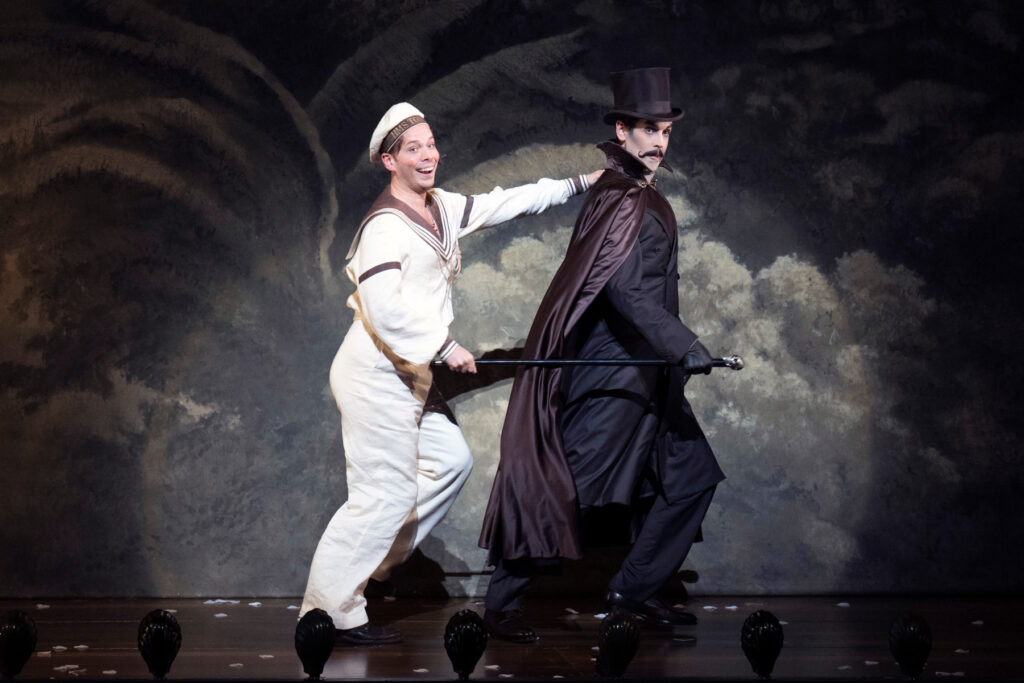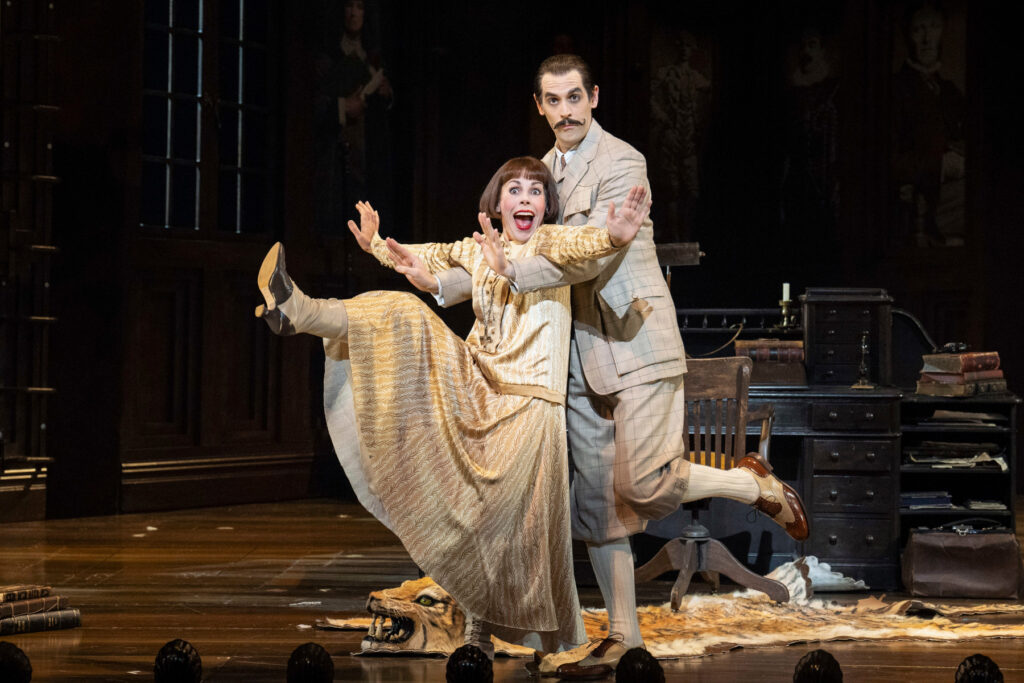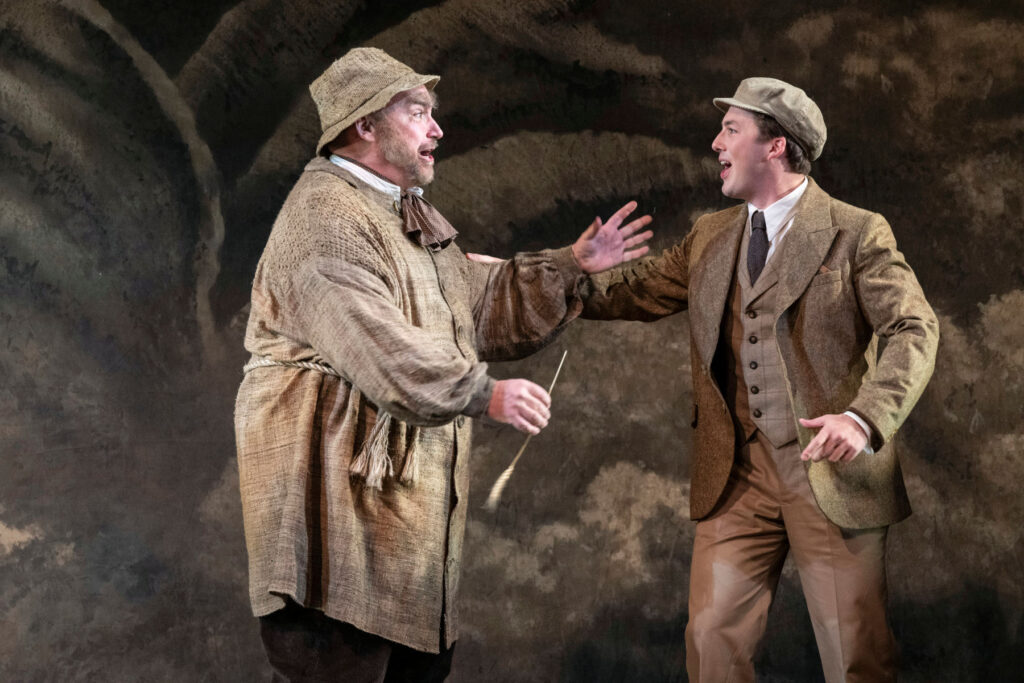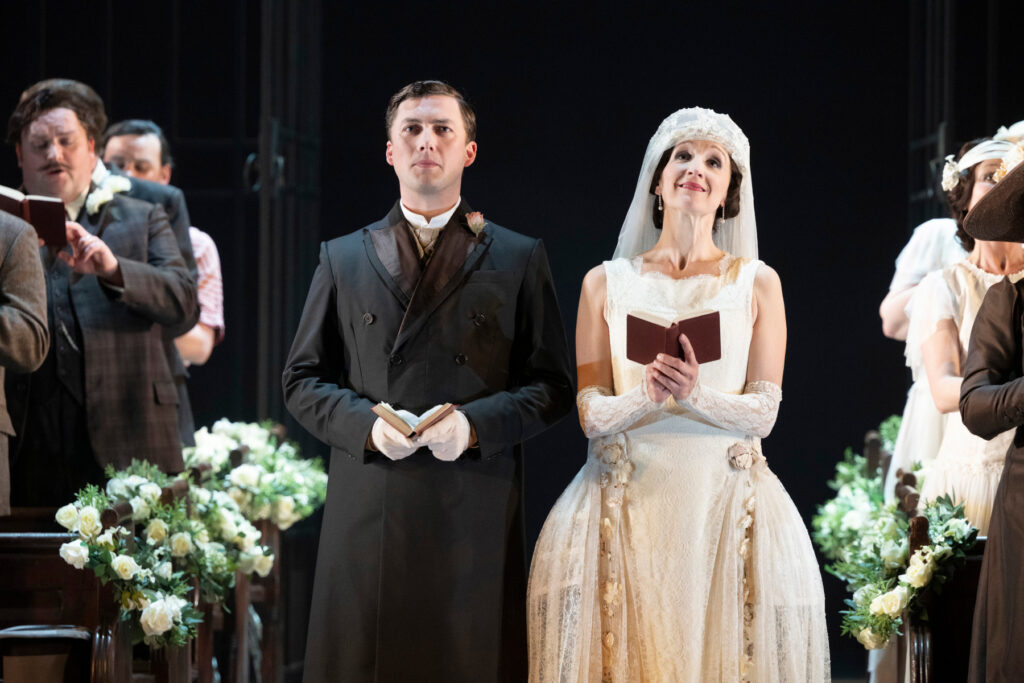Gilbert & Sullivan’s Ruddigore presents several challenges, notably the technical one of bringing the ghosts of the ancestors out of their portraits and the more philosophical one of Victorian melodrama. Jo Davies’ 2010 production of the opera for Opera North successfully surmounted these challenges, so it was heartening that the production made a welcome return for the company’s Autumn 2024 season, with three of the principal roles taken by members of the Opera North chorus.

The action was reset to the 1920s and the production really leaned into this with a silent film during the overture that explained Dame Hannah and Sir Roderic’s back story, with their love foiled by the curse. The dialogue had been adjusted somewhat, with additional lyrics by Richard Stilgoe, but the result felt like sympathetic tweaks rather than a wholesale reinvention. Act One moved from Rose Maybud’s bedroom to the coast, to the church, whilst Act Two was in the gallery at Ruddigore Castle. We never saw the twee Cornish village, and the use of a very traditional act drop (of a flower garden) enabled smooth transitions between the scenes.
I was impressed with the way the drama of the first act moved forward. This act can sometimes sag, feeling simply like a collection of fine songs, but here we were carried along. It helped that we had a first rate all-singing, all-dancing cast, and for once Xavier Hetherington’s Richard felt like a real anti-hero and part of the drama, rather than seeming like an oddity added because Gilbert felt like satirising sailors.

Amy Freston was a poised, very self-possessed Rose Maybud. Freston was brilliant at coping with Rose’s fondness for contorted, old-fashioned language, whilst her presentation leaned into the idea of silent film. Her idiotic fondness for relying on the book of etiquette came over well in her delightful opening number and Freston set Rose up for her adventure of constantly swapping men, not following her heart but the dictates of the book, which tied in with her almost flapper-like image.
It helped that as Robin (aka Sir Ruthven), Dominic Sedgwick made such an appealing hero, managing to bring off the character’s combination of bumptious self-regard and shyness. His early scenes with Freston’s Rose simmered nicely, whilst his transformation into a rather woeful Sir Ruthven was most entertaining. Sedgwick’s good-boy, public school demeanour and slightly dim manner meaning that this Sir Ruthven really struggled and fun it was too.

As the dastardly Richard Dauntless, Xavier Hetherington really laid on the jack-tar charm and produced the sort of performance, complete with his dancing, that won the audience over. He had a way of almost breaking the fourth wall, bringing the audience into his confidence. The crucial scene where Hetherington’s Richard revealed to John Savournin’s Sir Despard that Sir Ruthven did not die but was Robin Oakapple managed to be both dramatic and funny.
Of course, it helped that for most of Act One, John Savournin was a cloak-twirling delight as the bad baronet, yet Savournin brought great style to the role too and you sensed Sir Despard’s regard for his image. Savournin is an experienced Gilbert & Sullivan hand (his patter number was to die for) yet he has wider operatic experience so there was much to appreciate in his musical performance. In dialogue, he had a neat way of managing to say more (or less) than the text meant, and this was finely done in the finale to Act One and in Act Two, effectively redefining Sir Despard’s relationship with Mad Margaret.

Helen Evora was a remarkably skittish Mad Margaret. A nicely over the top mad scene was followed by a performance in which Evora brought real fun to the character. Evora had a slightly lighter voice than is often the cast with this character, and there was never a sense that she was just a mad old woman. In her Act Two scene with Savournin, the two had great fun with their exotic dance sequences, whilst Savournin’s reactions to Evora’s over the top presentation of Margaret’s madness gave great strength to the scene.
Steven Page gave a nice strong upper lip to Sir Roderic Murgatroyd in his First World War uniform, and Page sang the ghosts scene in Act Two with great relish but made his reconciliation with Claire Pascoe’s Dame Hannah rather touching. Pascoe had delivered Dame Hannah’s act one explanatory solo with great feeling, making real sense when it returned at the end. Like Evora’s Mad Margaret, Pascoe’s Hannah was mature but nowhere near the elderly caricature, thankfully.
Gillene Butterfield provided sterling support in the small role of Zorah, the lead bridesmaid, with Butterfield making her into a real character. Henry Waddington produced some vivid turns as Old Adam Goodheart, particularly relishing the character’s transformation from nice old codger to evil henchman.
The finale to Act One was set in the church, with a series of failed weddings that managed to articulate the drama brilliantly, and the music was complemented by some vivid stagecraft. For the ghosts’ scene, the main chorus was kept off stage, but seven key ancestors really did emerge from their portraits (the illusionist working on the effects was Paul Kieve) and richly characterful they were too.
The main chorus was indeed hard working; though there were three dancers, much of the chorus work involved music and movement (choreography by Kay Shepherd). The women made the slightly annoying perpetual bridesmaids a complete delight, whilst Richard Dauntless’s shipmates were dancers and the male chorus stayed as bucks and blades; here bowler-hatted men who, in their first scene in Act One, promptly started stripping off and putting handkerchiefs on their heads at the seaside.
Overall, musical values were strong, and everyone rose to the particular challenge that G&S presents with its mix of music and text. The delivery of the text was clearly paramount, and the various patter numbers were deftly done indeed, though in the patter trio, ‘My eyes are fully open,’ I was amused to note that for the final verse, sung by John Savournin, Kraus increased the tempo without any apparent disturbance to Savournin’s patter skills.
In the pit, Anthony Kraus conducted with real love, and it was a pleasure to be able to hear Sullivan’s score with its full orchestration and the players brought relish and style to Sullivan’s remarkably rich score. The ghosts’ scene is perhaps the most serious Sullivan got in a G&S opera, but there was much else to enjoy.
This was one of those performances where we were drawn into Gilbert & Sullivan’s topsy turvy world without any thought of directorial pensées. Everyone on stage and in the pit seemed to be enjoying themselves, and the result was an engaging evening of fun demonstrating the very real virtues of Gilbert & Sullivan at its best.
Robert Hugill
Ruddigore
Composed by Arthur Sullivan
Libretto by William Schwenk Gilbert
Cast and production staff:
Amy Freston – Rose Maybud; Claire Pascoe – Dame Hannah; Dominic Sedgwick – Robin Oakapple/Sir Ruthven Murgatroyd; Henry Waddington – Old Adam Goodheart; Xavier Hetherington – Richard Dauntless; Helen Evora – Mad Margaret; John Savournin – Sir Despard Murgatroyd; Steven Page – Sir Roderic Murgatroyd; Gillene Butterfield – Zorah
Jo Davies – Director; James Hurley – Revival Director; Anthony Kraus – Conductor; Orchestra & Chorus of Opera North
Opera North at Grand Theatre, Leeds, 26 October 2024
Top image: Claire Pascoe as Dame Hannah (centre) with ladies of the Chorus of Opera North as Bridesmaids
All photos by Richard H Smith